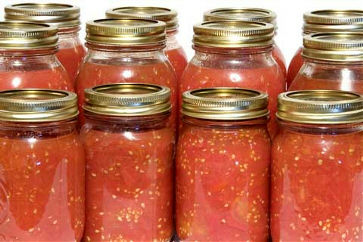
Before the invention of the refrigerator, icehouses were used to provide cool storage for most of the year. Root cellars were built for example, near freshwater lakes or ponds. These cellars were kept packed with snow and ice during the winter months. On mountainsides, runoff from melting snow is a convenient way to cool drinks. During the winter one can keep milk fresh much longer just by keeping it outdoors. In the early 1900’s, about half of households in the United States relied on melting ice (in an icebox) to keep food cold. While the remaining half had no cooled storage at all, except for a "root cellar". The ice used for household storage had to be cut from frozen winter lakes or ponds and stored until needed. Whether you love to read cookbooks, are a novice chef, or experienced culinary artist you can be assured that if you can follow simple instructions and have the basic ingredients to work with cooking a delicious meal is not really a chore. Everyone these days has many demands placed on them. Learning to prepare and plan ahead is the secret to eating better and staying healthy. It is so tempting to reach for something quick and easy and if we are talking about prepared foods often times they are laden with salt and fat that we do not need. Take time to plan ahead. What type of oil do you use in cooking? In speaking about the subject the first thing that should come to mind are olives. There are many varieties of olive oil. The French believe they have the best olive oil. The Italians are convinced beyond a reasonable doubt that they produce the finest oils. But professional cooks in the know tell us that Spanish or Portuguese olive oil is without a doubt the very finest and that is what they use. Further, that there is a marked distinction between Californian, French, Italian and Portuguese olives. We soon came to realize that, not all olives were created equal. If you buy expensive olive oil in a small bottle at a boutique gourmet grocery store you may be surprised to know that most wholesale clubs and everyday grocery stores today carry Spanish or Portuguese olive oil in large bottles that is relatively inexpensive and probably much better for you. The nutritional and medicinal benefits of olive oil have been recognized by the people of the Mediterranean. Recent studies that we came across in wikipedia while researching the different variety of olives show that a Mediterranean diet, which includes olive oil, is not only generally healthy, but that consuming olive oil can actually help lower harmful LDL cholesterol. Olive oil contains antioxidants that discourage artery clogging and chronic diseases. So regardless of which side of the discussion you are on, we just wanted the record to show that olive oil made in Spain would be our first choice when a recipe calls for olive oil. We recommend a product like, Columela Extra Virgin Olive Oil a product of Spain. This oil has a very light buttery taste. After trying it you will agree that not all olives nor olive oils were created equal.
